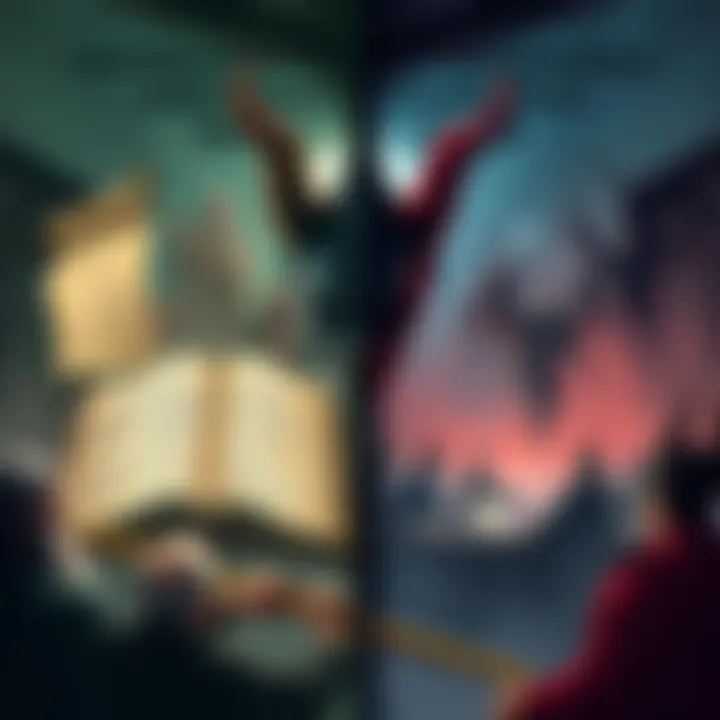Demons in Modern Discussion | Ancient Beliefs Resurrected
Edited By
Johnathan Blackwood

A recent conversation about demons has reignited debates over their existence among people. Influential voices, like Tucker Carlson, assert that demons might live among us in human forms. As of late 2025, theories and personal stories abound, complicating a genuine understanding of these beings.
Ancient Texts and Their Influence
Many beliefs surrounding demons find their roots in ancient texts. The Gnostics identified demons as "Archons" who supposedly rule over humanity, while Islamic traditions refer to them as "Jinn." Each cultural lens adds layers of complexity to what many see as mere supernatural fiction.
"Demons walk among us in human form,” claims one enthusiast, reflecting a sentiment shared by several people. This idea highlights a blend of perception and personal experiences.
Diverging Opinions on Demons
Debate rages regarding the identity and nature of demons:
Historical Context: Several comments highlight ancient interpretations. One commentator notes how the Nephilim, associated with such entities, were described as fallen beings, suggesting a direct connection to humanity.
Personal Experiences: Others have recounted dark encounters with people they deemed "demonic" in nature, showing a mix of fear and personal narrative.
Skeptical Views: A contrasting opinion suggests these ideas stem from a mix of psychological conditions like sleep paralysis or hallucinations. As one person pointed out, "Before science, people needed explanations for strange occurrences; superstition often filled that gap."
Mixed Sentiments
Overall, the sentiments expressed in various comments show a blend of fascination and skepticism:
Some think demons could exist, attributing them to deeply troubled human behaviors.
Others argue for a purely psychological explanation, emphasizing mental health issues rather than supernatural forces.
"Not saying it was, but it was aliens," claimed one skeptic, reflecting cultural references mixing with earnest inquiry.
Curiously, an online moderator seemingly aimed to clarify the ongoing confusion, stating, "Open an ancient book there’s an entire demon list with correspondences in the Key of Solomon."
Key Points of Discussion
Archons and Jinn: Various interpretations of demons stem from ancient mythologies.
Personal Accounts: People share unique stories that blur the lines between reality and legend, evoking a complex community of belief.
Psychological Factors: A significant viewpoint attributes paranormal experiences to mental conditions rather than to spiritual encounters.
Despite the conflict in opinions, the fascination surrounding demons continues to thrive, reflecting both a need for explanation and the timeless allure of the unknown. In a world brimming with uncertainty, are these entities a reflection of our fears or a deeper reality?
Speculations on the Rise of Beliefs
There’s a strong chance that discussions around demons and their existence will grow, fueled by ongoing personal testimonies and heightened interest in the supernatural. Experts estimate that, as more people share their narratives online, the intersection of mental health issues and cultural beliefs will keep the dialogue alive. This could lead to a resurgence of interest in ancient texts and rituals, which some might seek as tools for understanding modern fears. With growing public fascination, a potential rise in documentaries and discussions in social forums could further warp perceptions, making the notion of demons resonate more deeply in everyday life.
Shadows of the Past Illuminating Present Thoughts
Reflecting on the peak of witch trials in the 17th century, the mania surrounding accusations paints a striking parallel. Back then, fear fueled societal division, leading people to attribute misfortunes or odd behaviors to spectral forces. Just as the fervor gripped communities and tore at their fabric, today's dialogue over demons might reveal deeper societal anxieties about control and understanding in an increasingly complex world. Metaphorically, the cycle of fear, misunderstood experiences, and the drive for scapegoats remains a vivid reminder of how history can echo into current beliefs about the unseen, urging us to confront our fears rather than extinguish them.
